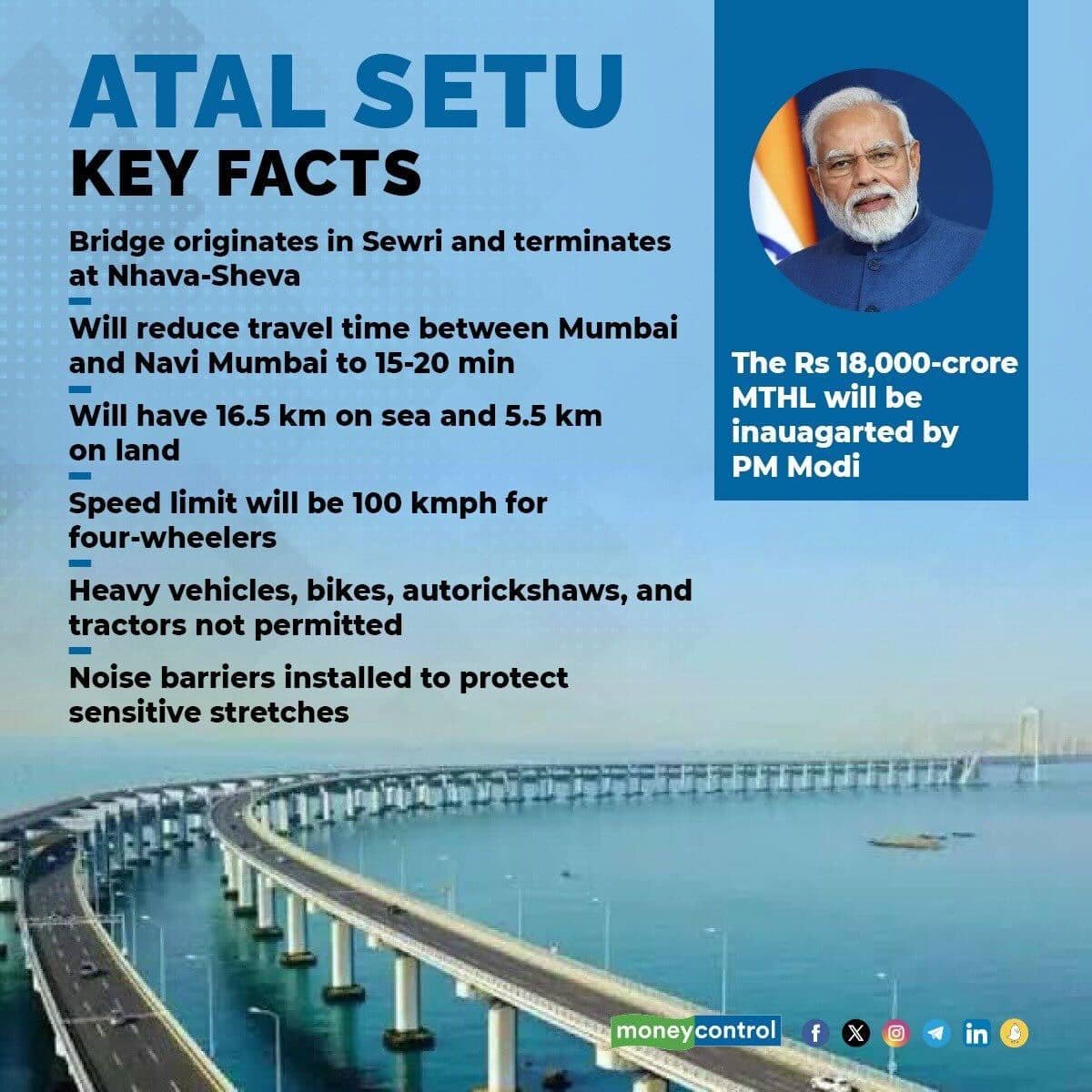



The Mumbai Trans Harbour Link (MTHL) or Atal Setu, inaugurated by Prime Minister Narendra Modi on January 12, is considered to be a historic milestone in India's infrastructure development.
By strategically linking key areas, the Atal Setu is set to alleviate the perennial issue of traffic congestion, providing a faster and more efficient route for daily commuters in Mumbai.
Here’s how the Atal Setu will impact the lives of commuters.
Less time to commuteThe bridge aims at reducing the commute between Mumbai and Pune on the one hand and between Mumbai and the under-construction Navi Mumbai Airport on the other.
Constructed at a total cost of over Rs 17,000 crore, the 21.8-kilometre-long bridge will bring down the journey from the current two hours to around 15-20 minutes. Currently, it takes about two hours to travel this distance.
According to reports, with the construction of the new airport in Navi Mumbai almost over, the bridge will ensure efficient connectivity from the mainland, particularly during peak hours. The MTHL will also make reaching Panvel far easier from central and south Mumbai.
Also read: Atal Setu: No bikes, autos allowed on India's longest sea bridge
It is India’s first sea bridge to incorporate an Open Road Tolling (ORT) system by allowing vehicles to pass through toll booths at speeds of up to 100 kmph without stopping.
Beginning in South Mumbai's Sewri, the bridge will pass through Thane Creek and terminate at Chirle village near Nhava Sheva.

The bridge will connect several key areas such as the under-construction Navi Mumbai International Airport, Mumbai-Pune Expressway, and Mumbai-Goa Highway. It will also have interchanges at Sewri, Shivaji-Nagar, Chirle, and other key spots to ensure better connectivity and the smooth flow of traffic.
Travel and fuel costsThe Maharashtra government has approved a proposal to charge Rs 250 as a one-way toll for cars on the MTHL. A passenger car will be charged Rs 250 as a one-way toll. There will be different charges for the return journey and daily commuters. Availing a daily pass for a car will cost Rs 625 and a monthly pass will be worth Rs 12,500.
Also read: Take a look India's longest sea bridge
According to reports, this also makes Atal Setu the most expensive toll road linked to Mumbai. In comparison, the Bandra-Worli Sea Link has a toll of Rs 85 for a one-way trip and Rs 127 for a return journey.
According to the Quint, it has been estimated that the use of the bridge will lead to savings of one crore litres of fuel per year and reduce CO2 emissions by over 25,000 million tonnes.
Boost to real estateThe Atal Setu is expected to bolster the Navi Mumbai property markets as the connectivity is likely to result in a surge in real estate activity, demand and prices. “The Mumbai Trans Harbour Link is a game-changer! As a proud Mumbai developer, I see this engineering marvel transforming connectivity and our real estate landscape. With travel times slashed to 20 minutes between Mumbai and Navi Mumbai, areas like Panvel and Ulwe will witness explosive growth. We anticipate a surge in demand for homes driven by professionals seeking affordable luxury close to prime business hubs," Manju Yagnik, Vice Chairperson of Nahar Group and Senior Vice President of NAREDCO- Maharashtra, told LiveMint.
According to experts, the property market of the entire region is expected to gain but more impact will be seen in micro markets such as Panvel, Ulwe, and Dronagiri which will get a direct linkage to the bridge.
They say several factors including new connectivity are expected to lead to a surge in property prices in Navi Mumbai within the next three years.
Discover the latest Business News, Sensex, and Nifty updates. Obtain Personal Finance insights, tax queries, and expert opinions on Moneycontrol or download the Moneycontrol App to stay updated!
Find the best of Al News in one place, specially curated for you every weekend.
Stay on top of the latest tech trends and biggest startup news.